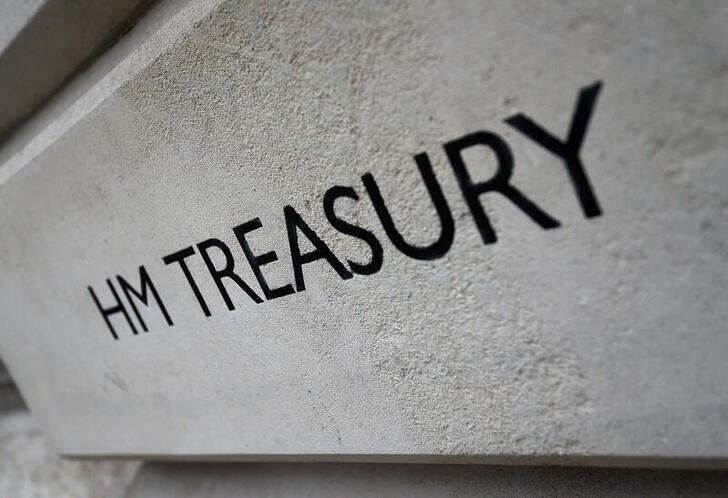By Andy Bruce
LONDON (Reuters) -Britain borrowed more than expected in April as high inflation pushed the government's debt interest bill to a new record for the month, even before expected tax cuts by Finance Minister Jeremy Hunt ahead of the next election.
Public sector net borrowing, excluding state-owned banks, rose in April to 25.56 billion pounds ($32.26 billion) - almost 12 billion pounds more than in April 2022, the Office for National Statistics said.
A Reuters poll of economists had pointed to public sector net borrowing, excluding state-owned banks, of 19.75 billion pounds.
"April's public finances figures got the new fiscal year off to a shaky start," said Ruth Gregory, economist from consultancy Capital Economics.
"But we doubt this will prevent the Chancellor from embarking on a fiscal splurge ahead of the next election, due to take place before January 2025."
British borrowing hit levels not seen since World War Two during COVID-19, taking debt to almost 100% of gross domestic product.
Hunt and Prime Minister Rishi Sunak have raised taxes in response but are under pressure from within their Conservative Party to cut taxes before the election, with the opposition Labour Party far ahead in opinion polls.
"It is right we borrowed billions to protect families and businesses against the impacts of the pandemic and Putin’s energy crisis," Hunt said after Tuesday's data.
"But debt and borrowing remain too high now - which is why it's one of our priorities to get debt falling."
Britain added 9.8 billion pounds to its debt interest bill in April - the highest total for the month since comparable records started in 1993, reflecting interest payable on inflation-linked government bonds.
Britain's rate of consumer price inflation was the highest in Western Europe in March, remaining above 10%. Data on Wednesday are expected to a show a drop in April to around 8.2%, according to the Reuters poll consensus.
The government spent 3.9 billion pounds on energy support payments in April, the first month of the 2023/24 financial year, up 1.8 billion pounds from a year ago.
That figure is likely to recede sharply with falling energy costs, as well as an expected reduction in the regulated price cap for consumer energy bills.
On top of higher spending, April's budget deficit reflected weaker receipts collected by the government at 69.7 billion pounds, down from 72.4 billion pounds in April 2022.
The ONS revised down its estimate for the budget deficit in the 2022/23 financial year that ended in March to 137.1 billion pounds, from 139.2 billion pounds previously.
In March, the Office for Budget Responsibility (OBR) forecast that borrowing in 2022/23 would settle at 152.4 billion pounds, 15.3 billion pounds more than the ONS estimate.
For the current 2023/24 financial year, the OBR's forecast of 131.6 billion pounds still looked about right, said economist Samuel Tombs from consultancy Pantheon Macroeconomics.

"We doubt, however, that public borrowing will fall to the low levels in the medium term predicted by the OBR last month. The OBR is too upbeat about the economy's medium-term economic outlook," Tombs said.
($1 = 0.7923 pounds)
